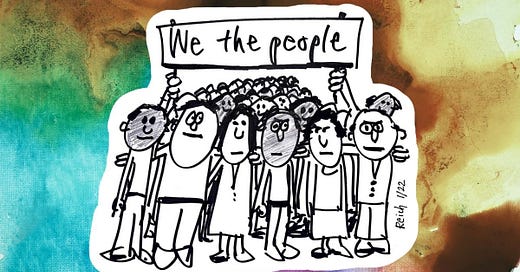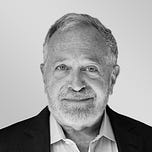We’ve gone through the shameful first anniversary of the attack on the U.S. Capitol and of the refusal of 147 members of Congress (all Republicans) to certify all the electors from states that voted for Biden, on the basis of no evidence of fraud. So far, no political figure has been charged with any criminal wrongdoing. We’ve seen 34 voter-suppression bills enacted by 19 Republican state legislatures; at least 8 give state legislatures the power to disregard election outcomes. More than 400 additional voter suppression measures are now being prepared. And we are now witnessing a struggle in the Senate to reform the filibuster so that voting rights legislation can be enacted. All of which raises a basic question: Is there still a common good?
I was at the impressionable age of fourteen when I heard John F. Kennedy urge us not to ask what America can do for us but what we can do for America. Seven years later I took a job as a summer intern in the Senate office of his brother, Robert F. Kennedy. It was not a glamorous job, to say the least. I felt lucky when I was asked to run his signature machine. But I told myself that in a very tiny way I was doing something for the good of the country.
That was more than a half century ago. I wish I could say America is a better place now than it was then. Surely our lives are more convenient. Fifty years ago there were no cash machines or smart phones, and I wrote my first book on a typewriter. As individuals, we are as kind and generous as ever. We volunteer in our communities, donate, and help one another. We pitch in during natural disasters and emergencies. We come to the aid of individuals in need. We are a more inclusive society, in that Black people, LGBTQ people, and women have legal rights they didn’t have a half century ago.
Yet our civic life—as citizens in our democracy, participants in our economy, managers or employees of companies, and members or leaders of organizations—seems to have sharply deteriorated. What we have lost is a sense of our connectedness to each other and to our ideals—the America that John F. Kennedy asked that we contribute to.
Starting in the late 1970s, Americans began talking less about the common good and more about self-aggrandizement. The shift is the hallmark of modern America: From the “Greatest Generation” to the “Me Generation,” from “we’re all in it together” to “you’re on your own.” In 1977, motivational speaker Robert Ringer wrote a book that reached the top of The New York Times bestseller list entitled Looking Out for # 1. It extolled the virtues of selfishness to a wide and enthusiastic audience. The 1987 film Wall Street epitomized the new ethos in the character Gordon Gekko and his signature line, “Greed, for lack of a better word, is good.”
The last five decades have also been marked by growing cynicism and distrust toward all of the basic institutions of American society. There is a wide and pervasive sense that the system as a whole is no longer working as it should. Racism, xenophobia, and religious intolerance are on the rise.
A growing number of Americans feel neglected and powerless. Some are poor, or Black or Latino. Others are white and have been on a downward economic escalator for years. Some have been seduced by demagogues and conspiracy theorists.
Is there a common good that still binds us together as Americans? Yes, and it’s not the whiteness of our skin, or our adherence to Christianity, or the fact that we were born in the United States. We’re bound together by the ideals and principles we share, and the mutual obligations those principles entail.
After all, the U.S. Constitution was designed for “We the people” seeking to “promote the general welfare”—not for “me the selfish jerk seeking as much wealth and power as possible.” During the Great Depression of the 1930s and World War II, Americans faced common perils that required us to work together for the common good. That good was echoed in Franklin D. Roosevelt’s “Four Freedoms”—freedom of speech, of worship, from want, and from fear. The common good animated many of us – both white and Black Americans—to fight for civil rights and voting rights in the 1960s. It inspired America to create the largest and most comprehensive system of public education the world had ever seen. And it moved many of us to act against the injustice of the Vietnam War, and others of us to serve bravely in that besotted conflict.
Americans sharply disagree about exactly what we want for America or for the world. But if we are to participate in the same society we must agree on how we deal with our disagreements, our obligations under the law, and our commitment to democracy.
It’s our agreement to these principles that connects us, not agreement about where these principles lead. Some of us may want to prohibit abortions because we believe life begins at conception; others of us believe individuals should have the right to determine what happens to their bodies. Some of us want stricter environmental protections; others, more lenient. We are free to take any particular position on these and any other issues. But as political equals in this democracy, we are bound to accept the outcomes even if we dislike them.
Our central obligation as citizens is to preserve, fortify, and protect our democratic form of government. We must defend the right to vote and ensure that more citizens are heard, not fewer. We must require that presidents be elected by the will of the people, and prevent political parties and state legislatures from disregarding the popular vote. We must get big money out of politics so the moneyed interests don’t have more political power than the rest of us.
Democracy doesn’t require us to agree. It requires us to agree only on preserving and protecting democracy. This meta-agreement is the essence of the common good.
Those now attacking American democracy are attacking the common good that binds us together. They are attacking America.
We must join together — progressives and conservatives, Democrats and Republicans, inhabitants of blue states and of red states, business leaders as well as leaders of nonprofits and of the public sector — to rescue American democracy from those who now seek to destroy it. There is no time to waste.
Your thoughts?














Share this post